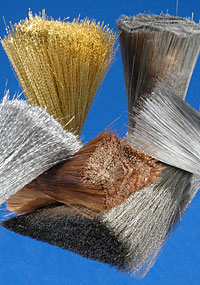Wire Materials

Steel is a heat-treated, high-tensile strength wire with excellent fatigue resistance and brushing action. Brushes with a wire diameter from .008" and above use high-carbon wire. Brushes with a wire diameter from .003" to .006" use hard drawn wire for fine surface work. Available in .003" to .020" wire diameters.
Stainless Steel Type 302 and Type 304 are the two types of stainless steel most commonly used in brushes. Type 302 is nonmagnetic, extremely tough, ductile and excellent for corrosion resistance. Type 304 the most widely used stainless steel and is similar to type 302. Type 302 and Type 304 become slightly magnetic when cold worked and have excellent fabrication and welding characteristics. Recommended where contamination or “after rust” is a problem such as brushing stainless steel and non-ferrous metals. Available in .003” to .020” wire diameters.
Stainless Steel Type 316 maintains a higher tensile strength at elevated temperatures. It also offers superior corrosion resistance in chlorides and many other environments than Type 304. Best choice for highly contaminated applications. Available in .003" to .020" wire diameters.
Brass is a non-ferrous and softer wire compared to steel and stainless steel. It has a high conductivity effective for reducing heavy static in a concentrated area. Brass is corrosion resistant and an excellent choice for cleaning scratch susceptible surfaces. Available in .003" to .020" wire diameters.
Phosphorous Bronze is a non-ferrous wire with excellent corrosion resistance, good fatigue life and high electrical conductivity for reducing static in a concentrated area. Bronze is used for better corrosion resistance and greater strength than brass. Available in .003" to .020" wire diameters.












 Home
Home